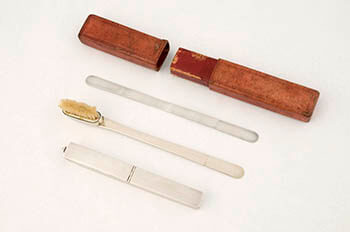Dentally Unready: Gen. George Washington's Lifetime of Dental Misery
 Visitors to the George Washington Mount Vernon estate and museum in Mount Vernon, Virginia, can see George Washington’s only remaining full denture among the collection. They include his own pulled and saved teeth, other human teeth, teeth from cows and horses that were filed to fit, and teeth carved from elephant ivory. (Courtesy of Mount Vernon Ladies’ Association)
Visitors to the George Washington Mount Vernon estate and museum in Mount Vernon, Virginia, can see George Washington’s only remaining full denture among the collection. They include his own pulled and saved teeth, other human teeth, teeth from cows and horses that were filed to fit, and teeth carved from elephant ivory. (Courtesy of Mount Vernon Ladies’ Association)
If you suffer from dental woes, you're not alone.
It turns out dental and oral health troubles afflicted President George Washington throughout his life, starting as young as age 24.
By age 57, Washington was wearing a full set of dentures even though he was "fastidious" about brushing his teeth with tooth powder, scraping his tongue of bacteria, and using mouthwash, according to information from George Washington's Mount Vernon estate and museum in Virginia. On display at the museum is Washington's dental hygiene travel kit.
Letters and diary entries throughout his lifetime often reference "aching teeth, lost teeth, inflamed gums, ill-fitting dentures, and a host of other dental miseries," according to the museum's information.
His communications also mention "payments to dentists and purchases of toothbrushes, teeth scrapers, denture files, toothache medication, and cleaning solutions."
Mythbusting
Legend has it that Washington had wooden teeth, but the museum's historians state that's not true. The appearance of his dentures may have looked wooden, "particularly after they had been stained," but wood was not used in constructing any of his dental fittings.
In his lifetime, Washington had many full and partial dentures made of a variety of materials, all of which required maintenance and attention.
The dentures included some of his own pulled teeth as well as teeth from other humans and "probably cow and horse teeth" that were filed down to fit his size, according to Susan Schoelwer, the museum's senior curator.
 George Washington suffered oral troubles throughout his life and was “fastidious” about his oral care, carrying a dental hygiene travel set with him on his travels. The set can be seen at the George Washington Mount Vernon estate and museum in Mount Vernon, Virginia. (Courtesy of Mount Vernon Ladies’ Association)
George Washington suffered oral troubles throughout his life and was “fastidious” about his oral care, carrying a dental hygiene travel set with him on his travels. The set can be seen at the George Washington Mount Vernon estate and museum in Mount Vernon, Virginia. (Courtesy of Mount Vernon Ladies’ Association)
Washington also had teeth made of ivory and metal alloys to include lead-tin, copper, and silver.
Concerned with his poor dental health and hoping that his original teeth would be fit into his new dentures, the Army general kept many of his pulled teeth in a locked desk drawer at Mount Vernon, according to museum records.
In a 1782 letter to Lund Washington, his distant cousin and temporary manager of the Mount Vernon estate, he requested the teeth be wrapped up and sent to him in Newburgh, New York.
"In a drawer in the Locker of the Desk which stands in my study you will find two small (fore) teeth; which I beg of you to wrap up carefully, and send inclosed [sic] in your next letter to me," says the letter. "I am positive I left them there, or in the secret drawer in the locker of the same desk," he added.
Washington's dentures were made by setting the teeth into artificial lead frames and held in place on the top and lower jaws of Washington's mouth by two metal wires that were curved to the shape of his jaw. While the lower denture was sized to fit Washington's mouth, the upper denture was flat on top.
"There's nothing to hold it in place or shape it to your mouth," said Schoelwer. To join them together, there were two, "very tight silver springs" so that when he opened his mouth, the springs forced the upper denture to rise with his mouth, allowing him to open and close it.
"Because that spring is so strong, it's always pushing against the top of your mouth, so in order to keep your mouth closed, you had to really grit your teeth all the time," she explained, noting his portraits depict how uncomfortable (and painful) this must have been.
In his 1789 inaugural address, Washington mentioned the "frequent interruptions" his health had suffered over his lifetime. At the time, he had a single remaining natural tooth, according to the museum's history.